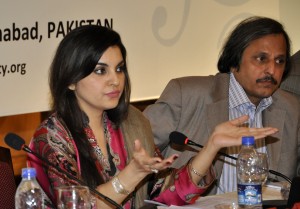
Journalist safety takes centre stage in Pakistan
Killed or coerced into silence. In some areas of Pakistan there is little to no independent journalism. A two-day conference in Islamabad launched new ways of combating the country’s growing journalist safety problem
By Andreas Reventlow
At least 90 media workers have been murdered in Pakistan since 2000, according to the IMS-supported Pakistani media development organisation Intermedia. Hundreds more have been attacked, injured, kidnapped, arrested and intimidated.
Discussing ways to counter the deteriorating situation for journalists in the country, media professionals from Pakistan sat together with their international counterparts at a conference last week.
UN plan launched

The conference set the stage for the launch of the so-called UN Plan of Action on the Safety of Journalists and the issue of Impunity in Pakistan.
The plan is a concerted approach to ensuring safe and enabling working environments for journalists around the world. Pakistan is one of five pilot countries that will see the UN plan implemented.
Addressing the worsening situation for journalists must done in a concerted manner between both local, national and international parties, said Lars Bestle, Head of IMS’ Asia department, as the conference opened:
“The UN Plan of Action provides the way forward to address the urgent need for a unified effort to protect media workers, in a manner which includes all relevant parties, including journalists, press associations, civil society, international groups, and crucially the Pakistani government.”
More on the UN Plan of Action >>
Journalists ‘simply vanishing’
In little over two months this year, five confirmed journalists were killed in line of their duty – one in Pakistan’s northwestern region North Waziristan and four in the Balochistan province.
The impunity on crimes against journalists means that media has simply vanished from some areas, said Owais Aslam Ali, General Secretary of the Pakistan Press Foundation, at the conference:
“It is not just the tribal areas… even in Karachi, reporters have accepted that there are some things they are not going to report on. In other areas they are simply vanishing.”
Making a difference on the ground
The conference resulted in setting up the Pakistan Coalition of Media on Safety, an alliance of media stakeholders in the country, as well as the International Friends of Media Alliance on Safety, made up of a dozen international media development organisations.
The two groups are now set to work together in shaping the future of safety for journalists in the country.
“The establishment of a national alliance is a big step forward in articulating a unified plan of action to stop the impunity and killings,” said Adnan Rehmat, Executive Director of Intermedia Pakistan. “It is crucial that the international coalition mobilises with the right kind of support to make a difference on the ground, and in saving lives.”
A joint effort
Pakistan is one of five pilot countries for the United Nations Plan of Action on the Safety of Journalists. The plan takes a so-called multi-stakeholder approach, which brings together the government, civil society groups, the Pakistani media sector and the international media development community.
The conference was organised by the IMS-supported Pakistani media development organisation Intermedia, and jointly supported by IMS, Open Society Foundations (OSF), and UNESCO.
Nearly 20 international media development organisations attended the conference, alongside media houses and representatives from the Pakistani media sector, the Pakistani civil society, security agencies, and the Pakistani government.
For more information see Intermedia or catch up on the discussions on Twitter with the hashtag #ImpunityPK.




